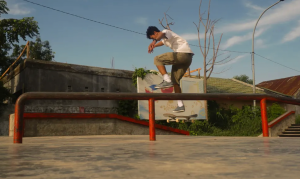Xavier Dphrepaulezz has had some rough times. Through creative slumps, a robbery at gunpoint, financial struggles, and a near-fatal car wreck that left him in a month-long coma, he soldiered on. But it was only after the birth of his son that the lifelong musician began to find his stride and success. Turning his back on a failed, more commercial attempt at a music career, the artist was reborn under the name Fantastic Negrito.
We spoke with Dphrepaulezz, who recently earned his first Grammy award for Best Contemporary Blues Album, this past December, hours after a benefit show for the victims of Oakland’s Ghost Ship warehouse fire about the blues, fatherhood, and pushing through the crap life never stops shoveling onto you.
After tragedies like the recent Oakland warehouse fire, how do we collectively come to terms with the idea that, had we been giving these young artists the press and attention in their lives that they’re now getting in death, they wouldn’t have been living in the conditions that lead to their demise?
I’m not really a blame person. It’s not what I do. This is tragic and could’ve happened anywhere to anyone.
That said, I wrote the album “The Last Days of Oakland,” and songs like “Working Poor” and “Hump Thru the Winter” are about the fact that we’re living in times where you may not even be able to live in your hometown, the city you grew up in.
We’re in very strange territory. This is the problem of excessive capitalism. It caters to profit only, and, oftentimes forgets the humanity.
How did a city become amazing? Well, creative, artistic, progressive people that thought outside the box could afford to live here and worked on making it great. Now that it is great, everyone else wants to come here to share in that vibe. But if you don’t maintain a space for the creative people, that city isn’t going to remain cool for long.
So this fire, that’s part of the story. You have people piled up in a place due to the extreme unaffordability of this city. And that’s not at all what this city was initially about.
Your music often speaks to pushing forward after losing everything. What words of encouragement do you have for those who might not want to keep going after something this catastrophic?
You push forward because life pushes forward. It’s not going to afford you the luxury of not pushing forward. These people that we lose—and I’ve lost people, young ages, from different circumstances—we push for them.
I lost a brother, age 14, to gun violence. I always call him my fuel. I go “I’ll push forward and succeed and build something amazing in your memory.”
So let’s not let these lives be lost in vain. Let it at least be a lesson, something we can learn from. Know that all you know can disappear at any time, so don’t take it for granted, people.
That idea that death could come at any time hints at the nihilism or fatalism often found in blues music. Is that sentiment more a callous that builds up over time or a consciously built protective wall?
I see it less as nihilism or fatalism than an acceptance of reality. I take it as if it was a means of survival for them. What they were singing about wasn’t the end for them.
Look at Greece. Look at Persia. Look at Rome, Egypt—all these fallen civilizations. They needed expression. And blues is our needed expression.
I never listened to Skip James or Robert Johnson or Charlie Patton, my heroes, and felt pessimistic. I always felt hope in the blues. When we express ourselves in the most sincere form, that’s optimism.
Sometimes you just gotta say it, though. You gotta say this is what’s happening to me. And while I’m very much an optimistic person, my music is immersed in the blues’ tradition of stating ‘this is what we have while up against insurmountable odds’.
Son of a Saint, one of the nonprofit partners for GOODFest, is focused on providing fatherly mentorship to boys without. I know the birth of your son was very important to your own creative renaissance. What do you wish to most impart to him, especially in these uncertain times?
The main thing I try to teach him, above all else, is love. It’s the most important thing in the world. Self-love, empathy, love for other people. Learning this is the key to everything. So I show him unconditional love.
The second thing is communication. There’s always communication and there will never be a wall that we can’t communicate over.
I think everything else falls underneath these two things in importance.
My dad would say, ‘When the police stop you, son, this is what you should do.’ And he’d act it out with me. I was wondering why this old man was doing this. But then when it did happen, I had the tools to deal with the police. And that all had to do with his love for me, and selflessness, and taking the time to know you’re not just living your life for you, but for someone else as well.
Speaking of police harassment, our other nonprofit partner for your show, The Ella Baker Center (for Human Rights), deals with systemic racial inequalities. Obviously, you’ve gone your whole life experiencing these to some degree, but have you ever been impacted by them in such a way that it translates directly into your art?
They’re a little hard to separate. As James Baldwin said, “I didn’t invent ‘nigger.’” That’s someone else’s creation. I got to this party and that was already happening.
At the same time, I don’t let that define every single thing in my life. Racism, that’s somebody else’s problem. I don’t wake up every day and think about what’s not happening for me because of the color of my skin.
But I know it’s out there. It’s woven into the fabric of this country. America was founded on the principles of freedom for some and none for others.
But I have a saying at my concerts. “Take that bullshit and make it into good shit.” I live by that. Bullshit’s not gonna stop me.







